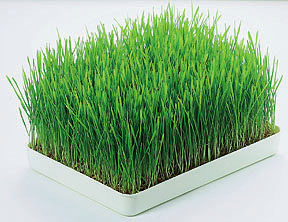Wheat Grass
From Wikiwel

See also : Chlorophyll
Wheatgrass (Triticum aestivum) is a popular juicing ingredient made from the newly sprouted shoots of wheat grains. Rich in chlorophyll, beta carotene and antioxidants, wheatgrass is touted as a natural remedy for a number of health conditions.
Contents
Special Precautions of Wheat Grass
- Although wheatgrass is generally considered safe, it may trigger certain side effects (such as nausea, headache, hives and swelling in the throat). Since hives and a swollen throat can signal a serious allergic reaction, it's important to seek immediate medical attention if you experience either symptom after consuming wheatgrass.
- Since introducing large amounts of wheatgrass juice into your system too quickly can cause nausea and diarrhea, it's important to start with no more than two to three tablespoons daily.
- Some individuals are allergic to wheatgrass, so seek immediate medical attention if you experience hives or swelling in your throat after ingesting the juice.
- Drug Interactions : Wheatgrass is high in Vitamin K, which can cause the body to form blood clots. For this reason, the National Institutes of Health cautions those who take the prescription medication Warfarin (also called Coumadin) to limit the foods they consume that are high in this vitamin because it can limit the drug's effects, possibly increasing the risk of heart attack or stroke. Other foods that include high quantities of Vitamin K include kale, spinach, turnip greens, collards, Swiss chard and mustard greens. If you are taking Warfarin, speak to your doctor before you try wheat grass. It's all right to eat some foods that contain Vitamin K, but you should eat them consistently and in small doses.
- Not Recommended During Pregnancy : Many foods, drugs, activities and other factors can affect the health and safety of pregnant women and the babies they are carrying. Check with a doctor before you take any food product or herb that claims to benefit health. Wheatgrass has not been studied adequately regarding its possible side effects it might have on a developing fetus, so responsible health care practitioners advise against starting a wheatgrass juice regimen during pregnancy, just to be safe. Nursing mothers also should avoid taking wheatgrass because it might contain contaminants (as its production process isn't scrutinized in the same way as more closely regulated food products).
The benefits of Wheat Grass are
Wheat Grass is packed with chlorophyll, amino acids, vitamins, minerals, and enzymes.
- cancer : This therapy consists primarily of detoxification and consuming a wheat-grass drink several times each day. Fresh wheat grass in this form is a potent source of many vitamins, minerals and plant enzymes. Thus, it is said to be nature's own nutritional program. Wheat grass also contains Amygdalin (Laetrile), although other sources, such as apricot seeds are more potent.
- boost the immune system
- detox : An all-natural and powerful detoxifier, wheatgrass protects the liver and purifies the blood by neutralizing toxic substances such as cadmium, nicotine, strontium, mercury and polyvinyl chloride.
- increase energy
- improve digestion
- reduce cravings
- preserve eyesight
- promote weight loss
- stimulate the thyroid.
- Chlorophyll found in wheatgrass can raise the body's oxygen levels and, in turn, treat or prevent cancer.
- agains bronchitis
- the common cold
- constipation
- gout
- high blood pressure
- high cholesterol
- indigestion
- inflammation
- insomnia
- reduce symptoms of ulcerative colitis and Inflammatory bowel disease (IBD)).
- Wheatgrass and Chemotherapy : Wheatgrass may help fight myelotoxicity caused by chemotherapy, suggests a 2007 pilot study in Nutrition and Cancer. A potentially life-threatening condition, myelotoxicity is marked by suppression of bone marrow activity. The study involved 60 patients undergoing chemotherapy for breast cancer. Among those given a daily serving of wheatgrass juice during the first three cycles of chemotherapy, researchers observed a significant reduction in myelotoxicity. Although wheatgrass juice did not appear to interfere with the effects of chemotherapy, six patients did experience a worsening of nausea that resulted in their discontinued use of wheatgrass juice.
- High Cholesterol : Animal-based research indicates that wheatgrass may help lower cholesterol. In a 2011 study from Acta Poloniae Pharmaceutica, scientists discovered that treatment with wheatgrass juice helped reduce total cholesterol and LDL ("bad") cholesterol in rats with abnormally high cholesterol levels. However, it's not known whether wheatgrass might have the same cholesterol-lowering effects in humans.
- Another study found that children with thalassemia (a hereditary type of anemia) showed a reduced need for blood transfusions when they drank 100 ml of wheatgrass juice daily.
- grey Hair : wheatgrass juice has been shown to turn gray hair back to its natural color : According to Traditional Chinese Medicine, hair pigmentation is influenced by the quality of blood and the strength of the kidneys. If your hair has gone gray, your kidneys and blood need to be strengthened. Foods that accomplish this include wheatgrass and any food with high chlorophyll content.
References
Medical Disclaimer
This information is not meant to be substituted for medical advice. Always consult a medical professional regarding any medical problems and before undertaking any treatment or dietary changes.